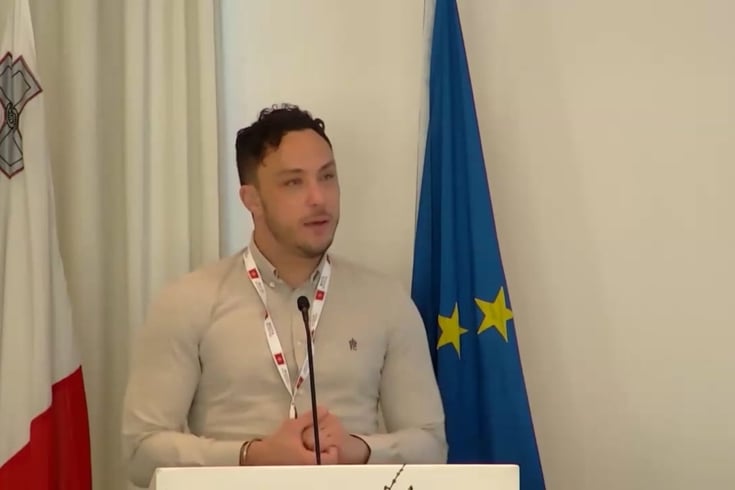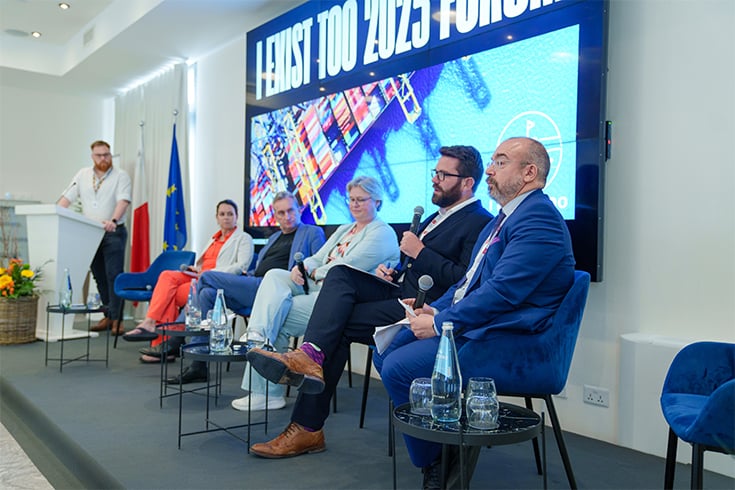On a quiet spring morning in Malta, voices that are too often unheard in the maritime industry took centre stage.
The I Exist Too 2025 conference, one of the few global events dedicated to exploring LGBT+ experiences in the maritime sector, brought together seafarers, legal experts, leaders, and allies for two days of honest, challenging, but necessary conversation on diversity and LGBT+ rights at sea.
This was more than a conference; it was a mirror held up to an industry that often prides itself on resilience but too rarely examines the cost of invisibility.
What unfolded was not just a sharing of experiences; it was a dismantling of silence. Every panel, every speaker, every pause between words became a moment to reflect on the realities that are too often brushed aside. These were not abstract policy discussions. They were stories of fear, courage, laughter, loss and survival, told not to provoke sympathy, but to demand recognition and action. When space is made for truth, connection follows. And when the connection is made, change begins.
This is the conversation the maritime industry has avoided for too long. But now, with growing urgency, it must face the silence and, more importantly, decide what to do next.
A silent ocean economy
Inclusion in maritime isn't just a matter of ethics; it's a matter of safety. Repeatedly, speakers called out a truth often whispered but rarely acknowledged publicly: for many LGBT+ seafarers, silence is a survival strategy. But silence does not equate to safety. The lack of visibility, policy protection, and basic recognition creates not only harm to individuals but also reputational and operational risk for maritime organisations.
One panellist described choosing between staying closeted or risking crew dynamics and their wellbeing. Another shared the anxiety of navigating changing port laws, where being out could mean detention or worse.
These are not hypothetical scenarios. There are over 60 countries where same-sex relationships are criminalised, and some where they are punishable by imprisonment or even death. For maritime professionals whose work routinely crosses borders, this creates a high-stakes landscape where their very identity can become a liability. A single port call could mean concealing one's identity or removing visible markers of queerness; all to avoid arrest, harassment, or punishment.
Larger shipping companies and maritime organisations are well-versed in navigating local port regulations, international trade laws, and safety compliance requirements; yet when it comes to human rights and diversity, that same rigour is far more challenging to navigate. One legal expert at the conference shared the story of a seafarer denied shore leave in a Gulf state after port authorities questioned their "non-masculine appearance," despite their documentation being in order.
Adding to this complexity is the jurisdictional grey zone of maritime law. Depending on a vessel's flag, employment contract, or where an incident occurs, seafarers may fall outside the protection of both their home country's laws and their organisation's internal policies. What begins as an HR issue quickly escalates into a question of human rights. And in many cases, there is no clear recourse.
This is the world LGBT+ seafarers navigate every day. Research by Nautilus International (2022) found that 76% of LGBT+ seafarers actively conceal their identity while at sea, and over 60% have encountered homophobic or transphobic language onboard. These aren't isolated experiences; they are the norm for too many. And it's why the industry must evolve from silence to action, because neutrality, in this context, is anything but safe.
The issues shaping LGBT+ inclusion at Sea
- "Coming out" is a constant process shaped by crew culture, contract length, flag state, and perceived risk. What feels safe on one vessel might be threatening on another.
- Isolation and depression were common themes, particularly on long voyages without psychological support.
- Psychological safety was often found not in policy, but in people. A supportive crewmate, a senior officer who led by example, or a simple WhatsApp message saying, "I'm here to support you," made all the difference.
- Dominant ideas of masculinity were called out as one of the most significant barriers to psychological safety, visibility, and inclusion onboard.
- Several speakers highlighted the emotional and psychological toll of code-switching, altering speech, behaviour, or appearance to conform to dominant masculine norms. This constant self-monitoring, they argued, is draining and reinforces the message that authenticity is unsafe.
- Toxic banter, suppressing vulnerability, and expectations to "man up" perpetuate a hostile environment for LGBT+ seafarers.
- Panellists urged the sector to redefine strength, not as stoicism, but as empathy, adaptability and mutual support.
- A British cadet was denied sea time on a foreign-flagged vessel because she was a woman. Though UK courts ruled it discriminatory, they claimed they had no jurisdiction, highlighting how flag states can override domestic protections.
- Several speakers called for updates to the Maritime Labour Convention (MLC) to explicitly protect against discrimination based on sexual orientation and gender identity.
- Even seafarers from progressive countries may lose protection once they cross into international waters, due to legal loopholes and weak enforcement.
- Leadership behaviour was consistently highlighted as the single most significant factor shaping onboard culture. The tone set by a captain or senior officer can determine whether a voyage feels survivable.
- “Once you’re on a ship and you’re out at sea, it becomes its own habitat.” When home isn’t an option, allyship onboard becomes vital, shaping the emotional climate of life at sea.
- Allies were encouraged to use their voice and privilege not to speak over others, but to create space, interrupt harmful behaviour and model inclusive norms.
- A recurring frustration was the disconnect between corporate DE&I statements and the reality on the board of a vessel.
- Several crew members reported that feedback and complaint systems either ignored LGBT+ experiences or actively discouraged reporting.
- Panellists called for training that is trauma-informed, crew-relevant, and delivered in ways that account for time zones, languages, and the lived realities of participants.
- One panellist shared how, as the only woman on board, she fled to a separate bar from her crew to find a space where she felt safe being herself. For many LGBT+ or neurodivergent seafarers, this isolation is routine.
- Another panellist, a former officer, described how hiding his identity over several VLCC voyages led to such intense psychological strain that he left the industry entirely.
- Seafarers are taught how to stitch wounds, but not how to support someone with mental health challenges.
- Mental health professionals at the event noted that many symptoms reported at sea, from insomnia to suicidal ideation, are not individual weaknesses but responses to unsafe conditions. Real support must address the root causes.
- ISWAN’s SeafarerHelp helpline has reported a rise in mental health calls involving identity-based distress, particularly among trans and non-binary crew. LGBT+ seafarers are disproportionately impacted by long-term isolation and stigma at sea, compounding the risk of depression, anxiety, and suicidal ideation.
- Employers shared post-tragedy stories, including suicide at sea, that led them to partner with mental health services like ISWAN to deliver proactive training.
- The IMO was named as a key player in future change. Belgium’s recent proposal to expand its “Women in Maritime” programme to include LGBT+ professionals received broad support from governments and NGOs.
- Domestic laws like the UK Equality Act often stop at the shoreline. Speakers urged both governments and industry groups to build protections into contracts and shipboard standards.
- Maritime schools are driving systemic change. In Catalonia, gender-perspective training is now mandatory across all maritime programmes.
- Panellists emphasised the importance of representation in training environments. “We can’t train for inclusion at sea if we’re not living it on land.”
- Union leaders shared how DEI clauses are increasingly being embedded into labour agreements, moving beyond vague anti-harassment language to enforceable protections.
- However, many LGBT+ seafarers expressed deep mistrust of unions due to past experiences with bias and exclusion. Repairing that relationship requires transparency, accountability and active outreach.
- The ITF has created LGBT+ visibility materials and opened the door to DEI motions, inspired in part by calls from events like I Exist Too.
Across two days of powerful panels and open dialogue, I Exist Too 2025 wove together stories of identity, exclusion, survival, and hope, all set against the often-isolating backdrop of life at sea. From cadets navigating training systems to officers working under hostile environments, the thread was clear: being LGBT+ in the maritime industry still requires silence, code-switching, and strength few recognise.
We began with the human cost of invisibility. Research from over 100 interviews revealed that many LGBT+ seafarers had never knowingly worked alongside someone like themselves. One seafarer shared: “I’m not here to be tolerated. I’m here to do my job — safely and as myself.” The emotional burden of hiding – adjusting voices, names, and behaviours to avoid harm – was repeated across experiences. “Once you’re on a ship and you’re out at sea, it becomes its own habit. You don’t get to go home and reset.” Employee Networks, such as Unity at Lloyd’s Register, discussed how the basics of building awareness and offering training can be a key lifeline for those on shore and at sea.
Maritime students described how outdated dress codes, invisibility in the curriculum, and a lack of allyship shape their training. “We’re not asking for special treatment. We’re asking for the truth,” one cadet said. Educators echoed the call, highlighting structural inertia and leadership gaps. In Catalonia, mandatory gender-perspective training is already reshaping how future seafarers are taught. Still, the absence of openly LGBT+ mentors remains a barrier to real belonging.
And it’s not just about sexuality. When race, disability, neurodivergence, and religion intersect with queerness, exclusion deepens. “You can’t pick one part of me to respect. Inclusion means the whole person,” said one panellist. The call was clear: intersectionality isn’t a concept; it’s a strategy for safety, leadership, and retention.
But strategy without structure isn’t enough. Maritime law remains dangerously quiet on LGBT+ rights. The Maritime Labour Convention doesn’t name LGBT+ identities — a legal void that has real consequences. “We have safety standards for cargo. Why not for people?” asked one legal expert. Without recognition, there’s no protection.
Mental health featured heavily across sessions. Seafarers shared stories of depression, panic attacks, and the impossibility of asking for help in hypermasculine environments. One panellist put it bluntly: “You are not broken — your environment is.” From isolation to informal WhatsApp groups acting as crisis support, it was clear that cultural change, not resilience, is the answer.

Invisibility is even more pronounced in the fishing sector. Often informal, seasonal, and underregulated, LGBT+ fishers shared how they work in silence, largely ignored by regulators and left out of policy conversations. “We’re part of this industry too — just not the part that gets policy,” one speaker reminded the room.
The role of maritime authorities emerged as a pivot point. Flag states and registries were urged to move beyond technical compliance and begin applying identity-based safety checks. “The jurisdiction exists,” said one legal advisor. “What’s missing is the will to use it.” From certification standards to human rights training, speakers pushed for authorities to be active protectors, not passive observers.
Trade unions, too, were challenged to earn back trust. Many LGBT+ workers shared a history of feeling unseen or excluded by the very institutions designed to protect them. However, hope came from those who embedded DEI into contracts, grievances, and leadership structures. “Solidarity must include everyone, or it’s not solidarity at all.”
The cultural roots of exclusion were laid bare in a session on masculinity and maritime tradition. Panellists spoke of emotional suppression, toxic banter, and the expectation to leave identity ashore. One speaker offered a quiet truth: “You’re told to leave your identity ashore, but that means leaving yourself behind.” The industry’s ideal of professionalism, they argued, needs to be rewritten — one that values vulnerability and respect as strengths, not risks.
Policy talk returned with urgency. Panellists criticised DEI statements that never leave the C-suite, and training that doesn’t reach the ship. “If your DEI policy doesn’t survive a 3-month voyage, it’s not fit for purpose.” Grassroots employee networks were cited as models of bottom-up change, reminding organisations that inclusion cannot be imposed; it must be lived.

Keir Gravil (Chair), Karina Huls (MF Shipping Group), Karin Orsel (European Community Shipowners' Associations), Martin Layng (Lloyd's Register), Nils Haupt (Hapag-Lloyd) and Kostas Katsoulieris (North Standard) discuss turning DEI policies into action.
Finally, reflection. One year on from the first I Exist Too forum, speakers celebrated progress, from policy proposals to the official launch of the charity. But urgency remained. “We’re still asking for the basics,” one panellist said. The work ahead is cultural, institutional, and personal. And it must be shared. “Don’t just listen to us — act with us.”
Tangible actions for maritime stakeholders
Maritime Leaders:
- Run regular crew-wide inclusion climate assessments to identify risks and blind spots.
- Integrate LGBT+ safety into HSSE policies, recognising psychological safety as essential to well-being.
- Provide inclusive leadership training on bias, cultural intelligence, and identity-based harm.
- Set DEI KPIs into performance reviews and hold leaders accountable for cultural change.
Shipowners, Operators and Charterers
- Map LGBT+ legal risks at ports and adapt crew deployment or shore leave accordingly.
- Build DEI clauses into contracts with charterers, managers, and suppliers to set standards.
- Display inclusive signage onboard and communicate clear zero-tolerance messages for bias.
- Audit ships for cultural safety during inspections or post-incident reviews.
Flag States and Maritime Authorities
- Advocate for explicit LGBT+ protections in the Maritime Labour Convention and regulatory frameworks.
- Incorporate DEI into inspections, including crew interviews and culture spot checks.
- Create templates for DEI grievance systems with transnational applicability.
Colleagues and Allies
- Speak up against bias or banter; one voice can shift the crew’s tone.
- Create a safe space for open questions during training, allowing those who want to support their colleagues but are unsure how to navigate specific topics (e.g., pronouns) to do so.
- Check in with isolated colleagues, especially on long voyages or remote routes.
- Model allyship regularly, not just during Pride celebrations
The tide is turning.
The maritime sector thrives on tradition, but that can no longer come at the cost of the invisibility of a diverse future workforce. The I Exist Too 2025 conference made one thing clear: this conversation isn’t going away. It’s growing. It’s deepening. And the time for waiting is over.
For those at sea, inclusion is not about politics. It’s about safety, humanity, and the right to exist without fear. And for maritime organisations, it’s time to choose between staying silent or charting a safer, more inclusive course forward.
Learn how Lloyd’s Register is dedicated to diversity, equity and inclusion, and watch the I Exist Too conference in full by visiting their website.
Author Note: This article is informed by speaker testimony and leadership reflections captured during the I Exist Too 2025 conference. I Exist Too is a human rights organisation that seeks to promote the visibility and strengthen access for LGBT+ professionals within the maritime industry. Images and videos have kindly been provided by I Exist Too.


